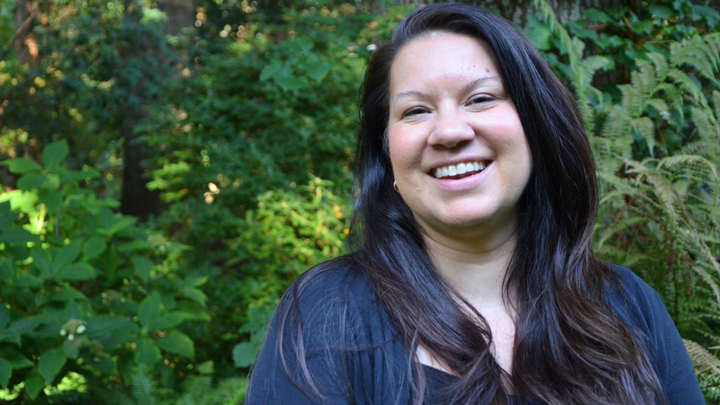UVic Law's inaugural Associate Dean Indigenous
October 22, 2025

Dr. Sarah Morales is the first Associate Dean Indigenous at the University of Victoria Faculty of Law.
Dr. Morales is one of four ADI's appointed throughout UVic. These senior academic roles are a significant step in advancing UVic’s Indigenous Plan—xʷkʷənəŋistəl | W̱ȻENEṈISTEL | Helping to move each other forward—and reflect our shared responsibility to uphold ʔetalnəwəl | ÁTOL,NEUEL | respecting the rights of one another and being in right relationship with all things.
The appointments respond to both community calls and faculty needs for dedicated Indigenous leadership to support curriculum reform, hiring and evaluation processes, mentorship of Indigenous students, and meaningful engagement with local Nations.
About Dr. Sarah Morales
Dr. Sarah Morales (Su-taxwiye) is Coast Salish and a member of the Cowichan Tribes. She is an Associate Professor in the Faculty of Law, Associate Dean Indigenous, and Director of the JD/JID Program.
Sarah's research focuses on Indigenous legal traditions—particularly those of the Coast Salish peoples—as well as Aboriginal law and human rights. Her scholarship is grounded in the laws and snuw’uyulh (teachings) of the Hul’qumi’num Mustimuhw.
She has been actively involved in nation-building efforts, the recognition of inherent rights and jurisdiction, and the advancement of international human rights law relating to Indigenous peoples. Her work with her own community and other Coast Salish nations has included child and welfare legislative reform, the development of community safety and well-being policies, Indigenous governance planning, and supporting negotiations around complex issues involving privately held fee-simple lands by centering Hul’qumi’num law and land tenure systems.
In 2024, Sarah won the Victoria Bar Association's Contribution to the Law Award for her work advancing the practice and implementation of Indigenous laws through her work with Cowichan Tribes.
Q&A
What does it mean to you to step into the role of Associate Dean Indigenous?
To me, stepping into this role means carrying forward the responsibility of “keeping my name clean.” In Coast Salish law, this teaching reminds us that our names are not ours alone: they are carried on behalf of our families, our ancestors, and our communities. To keep one’s name clean requires living with integrity, accountability, and respect so that one’s actions strengthen those relationships and safeguard them for future generations.
In practical terms, it means fostering spaces where Indigenous laws and ways of knowing guide our governance, pedagogy, and research. In this way, the role is not just administrative but rather a legal and ethical responsibility to keep the university’s name clean in its relationships with Indigenous peoples.
How do you think this role will help shift or shape the university in a good way?
These roles ensure the governance of the university take seriously the land acknowledgements, Indigenous plan and various other strategic policies, moving beyond university rhetoric of Indigenization to meaningfully ensure that the governance and administration of UVic is shaped by Indigenous visions of law, governance, and learning. It allows us to embed Indigenous laws and values into our governance structures, shifting away from symbolic inclusion and toward deep relational accountability.
What does meaningful Indigenous engagement look like in your faculty?
It means being accountable for how we carry ourselves in relation to Indigenous communities, both internal and external to the university. In Coast Salish law, engagement is not transactional but relational: it requires reciprocity, respect, and responsiveness to community-defined priorities. Within the Faculty of Law, that means engagement that values Indigenous communities as legal authorities and co-teachers or co-creators, and research that is accountable to those communities. It also means creating learning experiences where students encounter Indigenous law not as an abstract subject but as a living system practiced in community. I have seen the benefits of this approach through our field schools. In my experience it has led to positive transformations not only for the students, but for the Nations and institution as well.
Why is Indigenous leadership at this level important?
It ensures that the university is not simply including Indigenous perspectives, but is actually shifting power toward Indigenous laws, governance, and priorities. For Indigenous students and communities, it is a tangible signal that their voices matter and that the university is committed to walking in good relation.
In my experience, both as a student and a professor at institutions in both Canada and the United States, it makes a huge difference when Indigenous leadership is empowered to shape institutional directions. It can not only manifest large-scale visions that get captured in university policies and strategic priorities, but can also reconfigure and realign how we engage with one another and make decisions in the everyday.
What are your priorities or hopes for the first year in this role?
My priority in the first year would be to build strong and respectful relationships with students, staff, faculty, and the local Nations. Central to this work is listening. Listening will help to ensure that the role of the Associate Dean Indigenous is responsive to their visions and priorities.
By year-end, my hope is that Indigenous students feel more fully supported, Nations see their voices meaningfully reflected in our work, and colleagues come to recognize relationality and self-determination as guiding principles for the Faculty.
How do you see this role supporting Indigenous students, staff, and faculty?
I see the role of Associate Dean Indigenous as one of relational accountability. For Indigenous students, this means creating academic spaces where their laws, languages, and identities are not only respected but form part of the foundation of our collective learning. It means supporting them to carry their names proudly into their studies and their futures. For Indigenous staff and faculty, it means recognizing and valuing the unique responsibilities they hold, often balancing obligations to both community and university, and working to dismantle systemic barriers that make that balance difficult.
This role is not only about individual support, but about transforming the institution so that Indigenous students, staff, and faculty can thrive in ways that are accountable to their communities and to their own laws.
